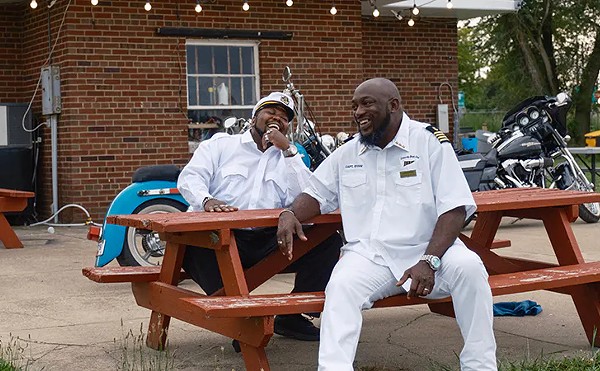Ten minutes later, Krotine steps out of the arctic chill of the dining room and into the withering heat of August. He wants to show off the sailboat he hopes to buy. Just a moment ago, he was talking about his murdered wife.
His wide hips concealed beneath a casual, bright button-down, Krotine meanders toward a line of boats parked on rollers near the security stand. He's 57, and his hair has mostly given way to gray, but has yet to recede. It's cut neatly, a holdover from his time in the army, when he transported Agent Orange in Danang. His easy smile reveals rows of misshapen yellow teeth.
The past two years have been arduous, and it shows in Krotine's sunken eyes. They look tired and unfocused, half-hidden in wrinkles. He stood trial three times for the grisly 2003 murder of his wife, Ramona, enduring two hung juries before a third found him not guilty in May. If he was stalwart in his defense, now he is mostly just numb. The ruling gave him his life back, though it scarcely resembles what he once had.
Prior to Ramona's death, Krotine had enjoyed an earned success. He was making $325,000 a year, managing a State Farm Insurance office he had cultivated from zilch. A consummate schmoozer, he boasts that he once claimed more auto policies than any agency in Ohio. When he went out to eat, restaurant owners would stop at his table and chat.
He and Ramona raised their three children in a comfortably modest four-bedroom colonial in Parma, and all of them were heading down the right path. Jeff Jr. was a chemist and recently married. Jennifer was studying accounting at the University of Cincinnati. Following in his father's footsteps, youngest son Jason had joined the Marines.
Today, Krotine has surrendered the house in Parma, which was sold to help cover his legal bills. His savings, once fattened in the promise of a leisurely retirement, have been drained to keep him fed and clothed. He subsists in the stale air of his former office on Rocky River Drive, where worn clothes and dirty dishes clutter the rooms. Though his children maintained their father's innocence at trial, they don't visit anymore. His in-laws, also estranged, are convinced that he killed Ramona.
There's nothing casual about the way Krotine talks nowadays. His eyes seek out insincerity like well-calibrated robotic sensors. If he's interrupted, he casts his eyes down and raises a protective hand, as if defending against an onslaught of hostile words. He's heard enough arguments for a lifetime; now, the only conversations worth having are those he leads.
Three months after his acquittal, Krotine is still navigating his freedom, trying to stitch a life -- a personality -- together. This boat is one more step toward feeling normal again, toward softening the numbness that enshrouds him.
"This is the Corvette of sailboats," he says, leaning against a small, sleek Highlander covered in a green tarp, its mast tilted over its hull. "I was going to buy it. But when other members here found out about it, they undercut me." Conspiracy, for Krotine, has become a central theme.
He gives the boat a gentle pat, then leads the way to a wooden gazebo by the water. A barely perceptible breeze drags across the waves and plays at his hair. His smile slips away. A pause drifts outward over Lake Erie. Then Krotine returns to talk of Ramona.
Greg Wilczewski drove aimlessly through Brook Park in search of his missing sister, as the sun set on Friday, March 21, 2003. An employee at the Ryba Fudge booth inside the I-X Center, Ramona had attended an exhibitors' party on Thursday night at the Clarion Hotel in Middleburg Heights. She was last seen walking to her Toyota Camry around 2:30 a.m. Friday morning.
Though his wife hadn't returned, Jeffrey Krotine went to work as usual that day. He met with a client at noon. He listened to radio news coverage of the U.S. invasion of Iraq, where their son's Marine unit had been deployed. He made numerous calls to Jeff Jr., who left work to wait at his parents' home, in case his mother returned. That afternoon, Krotine also surfed the internet for new mattress covers.
Around 11 p.m. Wilczewski happened upon Ramona's Camry in the parking lot of the Brookpark Road Rapid Transit station. The car was locked, and there was blood on the ground next to the back door. He peered inside and found more on the back seat. Then he shattered the driver's side window with a tire iron and popped the trunk. Inside he found his sister.
Ramona's face was horribly bruised, the result of blows that split her scalp open in several places. A gunshot wound from close range had left a dark hole above her left ear. Her black shirt was pulled halfway out of her jeans; her legs were bent behind her, arranged to fit inside the makeshift tomb.
A baby seat had been taken from the vehicle, along with $4,000 Ramona was planning to deposit for her employer that morning. Initially, it appeared to police that she had been the victim of a robbery that had escalated to murder.
By midnight, Brook Park police arrived at Krotine's house to deliver the grim news. Krotine never asked how she died, they would later tell prosecutors. He appeared to cry, but shed no tears.
For three weeks, police tried to flush out a suspect from sparse leads gathered from people who had been at the party. An autopsy yielded few clues. Then, when detectives drove past the Krotine home one afternoon, they found old carpet on the tree lawn and a work truck parked in the driveway. Krotine was remodeling his bedroom. The walls were freshly painted and the house had been professionally cleaned. Krotine said the new room would honor his wife's memory. It was painted bright yellow, with sun-like crescents on two walls. He told them that in his letters from Vietnam, he had referred to Ramona as his sunshine.
That night, detectives pulled the carpeting from a trash bin. On it, they found Ramona's blood. Jeffrey Krotine was now the main suspect. The crime scene, they asserted, had been staged.
Detectives spent 10 months building a case against Krotine. On February 2, 2004, he turned himself in and was charged with murder and tampering with evidence. Prosecutors allege the following chain of events.
Ramona had come home from the party late that night and climbed into bed, when Jeffrey suddenly turned violent. He beat her head repeatedly on the wooden headboard, rendering her unconscious. Then he wrapped her body in sheets and carried her to the garage. He removed the baby seat that was in the Camry for a nephew and placed Ramona in the back seat. Jeffrey then drew a 9mm handgun and shot his wife once in the head. He tossed items from her purse onto the floor of the car, perhaps to simulate a robbery, then transferred her body to the trunk and drove into town, where he abandoned the car at the RTA lot.
Cuyahoga County Prosecutor William Mason presented the case to the media with his signature self-assured vigor. He called it an instance of domestic violence that had quickly escalated to coldblooded murder. By the time the trial started five months later, Court TV had descended upon Cleveland.
If the evidence against Krotine was mostly circumstantial, it was also voluminous.
Ramona's blood was found on their bedroom door, on a step leading into the garage, and on the rim of a sink inside their home. A 9mm handgun Krotine kept in his office was the same basic type that fired the lethal bullet.
Ramona had been seen wearing black heels at the party, but her body was found in bloody socks and spotless white shoes -- a mistake made by Krotine in the heat of the moment, Assistant Prosecutor David Zimmerman asserted.
If the killer had simply been a random thief, he wasn't a very good one. Ramona's credit card, checkbook, and wedding ring were not taken, but her keychain was. "The only person who would take those keys would be someone who needs those keys to get back inside his house," says Zimmerman.
Prosecutors also pointed out peculiarities in Krotine's bedroom renovation. The carpet he discarded three weeks after Ramona's death was missing a four-by-six-foot strip between the bed and the bathroom. Krotine, prosecutors claimed, knew that piece would implicate him, so he took extra care in its disposal. After new carpeting was installed, Krotine pulled it up and painted the section of wooden floor once covered by the missing carpet.
"His paranoia got the better of him," says Assistant Prosecutor Anna Faraglia, who tried the case with Zimmerman.
Krotine's explanation for painting the bedroom in his wife's honor was also bunk, they claimed. "Ramona hated the color yellow," says Zimmerman. "The family members told us she hated that color."
Then there was the mistress. Interviews with former employees of Krotine revealed that he had carried on an affair with Mary Engel, a State Farm representative who worked in his office. For two years, they had been having sex in a third-floor room of the office, which prosecutors referred to as their "love nest." Ramona, the couple believed, never knew.
Most damning, according to Zimmerman, was Krotine's behavior in the first hours after his wife disappeared: how he went to work, although he knew that Ramona hadn't come home; how he surfed the web for a new mattress cover; how he reacted in front of police to the news of her murder. Krotine admitted each of these claims.
Yet he also had answers for just about every question. He pulled up the carpeting after he spilled cognac in a drunken stupor. The carpeting recovered by detectives did not appear to have been vigorously cleaned, as one would expect from a covered-up crime scene. Ramona's blood around the house? Only three drops were on the carpet. The trace amounts found elsewhere could have been left anytime in the past.
Moreover, if Ramona had been beaten in the bedroom, the place would have been covered in blood, according to testimony from Cuyahoga County Deputy Coroner Stanley Seligman. Ballistics tests could not confirm whether Krotine's gun was an exact match to the weapon that killed Ramona. Further, the defense argued, many of Krotine's employees knew that he kept the gun at work -- hidden under a hat -- not at home. He made no effort to conceal it after Ramona's death.
The Krotines' daughter, Jennifer, had slept in their house the night Ramona disappeared, in a bed just 11 feet from the master bedroom. If a violent struggle took place there, how did Jennifer sleep right through it?
"She never heard screams, an argument, a beating, a shot -- nothing," attorney William Doyle argued.
As for the affair, Krotine admitted to it, and he told his children about it before the trial began.
Police bungling, the defense argued, prevented them from finding the real murderer. Blood from someone other than Ramona had been found under one of the Camry's door handles, but Brook Park detectives never attempted to match it to anyone. A red fiber found on Ramona's body was lost, as were leaves that had stuck to her back. The defense team fixated on the shoddy work of Brook Park detectives for the better part of three hours before jurors began deliberations. It paid off: On August 4, 2004, the jury announced it was deadlocked at 9 to 3 in favor of conviction. Judge Timothy McGinty declared a mistrial.
Krotine hired four new lawyers for his autumn retrial, he says, because his first team told him he no longer could afford them. The prosecution returned the team of Zimmerman and Faraglia, with virtually no changes in their presentation. After three weeks of testimony, 10 of the 12 jurors sided against Krotine. On November 30, McGinty declared a second mistrial.
Assistant Prosecutor Steve Dever replaced Zimmerman and reconfigured the approach to the third trial. Dever's predecessors had laid out the circumstantial evidence only superficially, choosing instead to focus on Krotine's odd behavior in the wake of Ramona's disappearance. Actions could be explained away, thought Dever. Science could not.
When the third trial began on April 27, Dever zeroed in on the blood found on the bedroom door and the step inside the garage. Forensic pathologists were called to testify in detail about the blood evidence.
"Small means a lot," says Dever, referring to the minute drops that were recovered. "It's spatter. When the droplets are that small, it means it's coming at high velocity." According to pathologists, such droplets are the product of a severe beating that happened nearby, not of a typical household cut.
Krotine's defense countered with a surprise of its own. Mel Twining, an I-X Center vendor who saw Ramona at the hotel party, testified that he had stepped outside to smoke that night at around 2:30 a.m. He noticed a man standing by a Toyota Camry while someone else struggled to set something in the back seat.
"Later, I thought maybe it could have been someone holding someone down in the back seat," Twining says.
On the stand, Twining stunned jurors with another revelation. The day after the party, he attended a cookout at the house of Susan Ziegler, an acquaintance of Ramona's from the I-X Center. While Twining was there, Ziegler checked her voice mail; among the messages was one left at 6:45 a.m. that day -- a female voice pleading "Help me" in a whisper, before the line went dead.
"It sounded like somebody dying," Twining recalls. Ziegler had testified at all three trials, but mentioned the phone call only in the third trial. (She declined Scene's request for an interview.)
Twining says that prosecutors were aware of him for over a year, but that they greeted his story with anger and told him that he could hurt their case. "If they treat all their witnesses like me, it's no wonder no one testifies," he says. "I went down there to do some good and got treated terrible."
Krotine believes that the prosecution hid Twining, as well as the phone call to Ziegler's house, during the first two trials for fear that such evidence would diminish the case against him.
"That is absolutely incorrect," counters Zimmerman, who says he gave Twining's name to the defense before the first trial.
Perhaps the turning point in the third trial came when the Krotines' youngest son, Jason, took the stand. When he spoke of sleeping inside a hole half-filled with water during his stint in southern Iraq, his father broke down and cried. Then came the crucial question.
"If, for one minute, you thought your father brutalized your mother in that house, what would you do?" attorney Richard Drucker asked in a booming voice.
Jason stared calmly back, suddenly a Marine once more. "He wouldn't be here right now."
On May 27, Krotine was acquitted.
It's early June, and Jeffrey Krotine is sharing a booth near the back of the 100th Bomb Group restaurant on Brookpark Road with Mary Engel, the woman with whom he conducted a two-year affair. Engel had begun e-mailing Scene during the third trial, after The Plain Dealer published some of her testimony. She was upset that the paper laid bare her third-floor trysts with Krotine, yet didn't even spell her name correctly.
Slight of build, with a high voice and soulful eyes half-concealed under dark bangs, Engel edges in comments occasionally, but Krotine, who took over this conversation early on, shows no sign of letting up. She seems not to mind.
"During the trial, it felt like I was in slow motion and everything around me was sped up," Krotine says between forkfuls of tuna. "After the trial, I feel like I'm in fast-forward and everyone else is in slow motion. I imagine it's kind of like decompression. It's a feeling of coming back into society."
Toward the end of the third trial, prosecutors offered to reduce the murder charge to manslaughter in exchange for a guilty plea. Krotine would have served 3 to 10 years.
"The main reason I said no was I knew, if I took a plea deal, they would stop looking for my wife's killer," he says.
Krotine says he knows who murdered Ramona, thanks to the work of Chris Giannini, a private investigator hired by his lawyers for the second trial.
Witnesses say Robert Cameron danced with Ramona Krotine the night she disappeared. A handyman who lived in Lakewood, Cameron was employed by Sam Mazzola during the I-X Center's sports-and-outdoor show in March 2003. The two ran an exhibit that offered photographs taken with live bears and tigers. Mazzola says they attended the hotel party together at the end of the week.
As Mazzola left that night, he recalls, he offered Cameron a ride. It was late, and he knew that Cameron relied on public transportation. But he declined. The next day, Cameron showed up for work with long scratches on his head and hands, according to Mazzola and Giannini.
At first, Mazzola was fearful that people would think one of his bears did it. He asked where the marks came from; Cameron said he was mugged at an RTA stop by "three niggers." Mazzola suspected that Cameron was lying. When Ramona's body was found later that day, his suspicions escalated.
Giannini describes Cameron as an ex-con who is "deep for trouble." He pleaded guilty to felony theft in Lorain County in 1992.
Ray Boyle, who operated a fence-building company with Cameron in 2002, hasn't seen him since. Boyle says he ended their relationship after equipment and money went missing.
After Ramona's murder, Cameron moved four times before Giannini lost track of him.
"He's a scumbag drifter," Mazzola says. "He knew she was carrying $4,000 that night. He stole from friends of mine too. He knew everybody's business."
Mazzola and a friend were talking about Ramona's murder a couple of months later, when Cameron joined the conversation. "He told me that he got a ride from the hotel to the RTA station from Ramona that night," remembers Mazzola. "I looked at him and said, 'You killed her, didn't you?' I told him I would go to police. He said if I did, he would sue me."
Mazzola shared his story with Brook Park Detective William Lambert prior to the first trial. He was stunned by the response.
"This detective threatened me," he claims. "He said he was going to charge me with perjury. He said he wanted blood samples to see if I was at the crime scene. You know what? That was witness-tampering. I'm not going to be afraid of an old, washed-up detective who botched an investigation."
Detective Lambert and the Brook Park Police Department declined comment on Cameron or Mazzola.
Mazzola refused to take the stand for either side at all three trials. "I finally got to the point where I said, 'I don't know Jeff. I don't owe him anything. I can't do this anymore,'" he says. "I was done with it."
Krotine's defense never called Cameron to testify. In a conversation with Giannini, Cameron denied that Ramona had given him a ride.
"We didn't call him, because he wouldn't help us," says Michael Peterson, one of Krotine's lawyers in the third trial.
According to prosecutors, no evidence directly linked Cameron to Ramona's car. An arrest on an unrelated charge seemed to discredit Mazzola's claim.
"We have a booking photo from a week later, when he got into a fight at an RTA station, " says Assistant Prosecutor Zimmerman. "There are no markings, no scratches on his head."
Cameron sued Mazzola in 2004, claiming he had been injured by the hood of Mazzola's truck while filling the oil tank.
"That was his way of getting back at me for going to police," says Mazzola. The suit was dismissed when Cameron and his lawyer failed to show up in court, he says.
Reached at his home in Vermilion, Cameron referred all comment to his lawyer, Michael Duff. "He had absolutely nothing to do with this. The defense created this as a red herring, something to confuse the jury with," Duff says.
Krotine believes that Cameron killed his wife. But he insists that the man was no more than a pawn -- a hired gun in a sweeping conspiracy that implicates Krotine's longtime employer as well as the prosecutors who tried to put him away.
Krotine maintained a tense relationship with State Farm that went back at least to 1997, when, he says, local agents were asked to sign new contracts that would reduce their commissions on auto policies. Krotine was offered a substantial buyout, but with his long list of clients, he figured that he would be better off not signing. He believes State Farm has had it in for him ever since.
His paranoia escalated in the fall of 2001, when one of his employees, Trese Huber, defected to another State Farm agency, taking many of her clients with her. The following year, Krotine lashed out, filing a $4.5 million civil suit against Huber and State Farm for violating its own non-compete clause.
At this point, Krotine's theory veers sharply beyond mere legal squawking. Facing his lawsuit and still paying him the higher commission, State Farm figured that it would be cheaper to hire a hit man and frame Krotine for Ramona's murder, Krotine believes.
"The whole point was to take me out of the picture," he says.
From there, he maintains, State Farm executives pressured Cuyahoga County Prosecutor Bill Mason to hire someone to kill Ramona. Mason went along, in the hope that State Farm would contribute heavily to his reelection bid. (Mason easily won reelection in 2004; no record of contributions from State Farm or its employees was found through the Cuyahoga County Board of Elections.)
Not surprisingly, Krotine's alleged co-conspirators are taken aback by his theory.
"That's so patently ridiculous we don't even want to comment on it," State Farm spokesman Phil Supple wrote in an e-mail. (CEO Ed Rust Jr. declined comment.)
"He's a sick man," says Trese Huber, who still works for State Farm. "I don't want to be in his path."
Scene requested comment from Mason, but was told that Zimmerman would speak on his behalf.
"This guy has gone off the deep end," Zimmerman says of Krotine. "The story is just so ridiculous, it demonstrates how desperate he is to point the finger at anyone else.
"He knows he did this, and it weighs on him every day. He is so deluded, he'll even point the finger at Bill Mason now."
Even Krotine's own lawyers seem to cringe at the notion of a Mason-State Farm conspiracy. "I think he's a good man at heart," allows Michael Peterson. "He's just bizarre."
Krotine's suit against State Farm was dismissed in 2004. He remains insured by the company.
Though he has never owned a boat, Krotine joined the Edgewater Yacht Club back in 2001, when he was a wealthy State Farm agent. Last month he shelled out $4,000 from his savings to be reinstated. They took his money, but he doesn't feel welcome. People talk behind his back, he says, trying to find a way to force him out.
But he takes solace in regaining a small piece of his old life: The wind drifting off Lake Erie, the view of the towers of Cleveland in the distance, are well worth the four grand. He's thinking about a return to insurance. Maybe Allstate this time. "I don't really know how to do anything else," he says.
He still sees Mary Engel, though the two say they're just friends. His children go on with their own lives apart from him, the relationship made more complicated by the lingering presence of Engel.
"It seems like he's made his choice. We asked him not to come around anymore," says Jeff Jr. "This thing has totally ripped our family apart." Jennifer and Jason Krotine deferred to their older brother for comment.
Ramona's family no longer speaks to Krotine; neither her sister, Susan Bem, nor their brother, Greg Wilczewski, replied to numerous phone messages from Scene.
Technically, the search for Ramona's killer is still open. But Brook Park Police maintain that they already got their man.
"We stand by our investigation," says Chief Kevin McQuaid. "The evidence pointed only one way."
Krotine returns his gaze to the row of shiny white yachts stretching down the dock. He'd like to get back on the water. But in Cleveland, where an acquittal wasn't enough to wash away the blood so many see on his hands, Krotine isn't sure that's possible.
He leads the way to the parking lot and doesn't look back.












